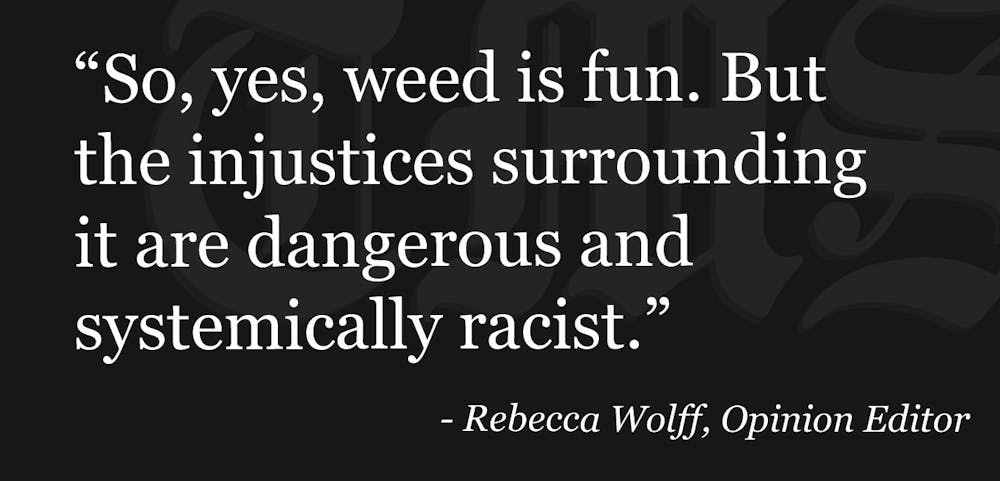Let’s cut the crap. Weed is fun.
And yes, I do refer to it as weed because I’m from California, and marijuana sounds a little stuffy.
It boosts local economies, creates jobs and it’s recent legalization for medical purposes in 36 states has taken much of the stigma away from it.
But according to the American Civil Liberties Union (ACLU) 2020 report on Racially Targeted Arrests in the Ear of Maijuana Reform, Black people are 3.4 times more likely to be arrested for possession of the substance than white people.
Even in states that have decriminalized marijuana, the disparity in arrests has not changed.
As a California native, I have seen first hand the amount of dispensaries and weed farms that have popped up over the last decade.
I even interviewed a man who owned a marijuana farm last summer for a profile I was writing, and he told me about his plans to eventually turn it into a retreat, where people could come purchase and enjoy the product.
He was white.
How can it be that Black people are being criminalized for the same thing white people are going on wellness retreats for, and no policy change seems to be making any real impact?
According to that same ACLU report, “Much of this country has yet to start on the road toward equitable, smart reparative marijuana policy.”
With inconsistencies between federal and state laws surrounding the topic, it’s difficult to nail down any specific legislation that could end the racial injustice Black people continue to face with marijuana.
There is an obvious “weed gap” happening across America, and it seems impossible for any one policy to close it.
Enjoy what you're reading?
Signup for our newsletter
Unless that legislation was federal legalization or decriminalization.
This is a racial justice issue.
Even before it was legalized in any form, it has never been a large issue for white people to use it, possess it or even sell it. NYPD reported that 94% of majrijuana related arrests in 2020 were people of color, meaning only 6% of arrested persons were white people throughout the five boroughs.
Of course there have been arrests on both sides of the color line, but the fact remains that Black people and other people of color are punished and jailed for it at higher rates despite the plant being used at equal rates by each race.
It’s become far more culturally acceptable over the last decade to use marijuana for both recreational and medical purposes, especially where I’m from.
I went to a Catholic high school that was extremely white. I had friends who dealt weed, smoked weed and even kept it in their backpacks.
The most trouble any of them ever got in was a three-day suspension. And that was after getting caught smoking in a bathroom.
But, if they had been Black, and a police officer would have walked into that bathroom, it could have drastically changed the course of their lives.
So, if white people can use it and deem it legal and safe enough to open up stores and run farms to make money off it, why are we allowing Black people in our society who do far less be criminalized for it?
We live in a country that is systemically racist. This is not new information.
If decriminalizing weed is one small way in which we can take a small step towards equality, then why wouldn’t we do it?
I get some people might have concerns about the fact that it’s considered a drug, and they might think it’s dangerous.
But the fact is if we legalize marijuana, we can regulate it.
Weed is out there, and people are using it — for all sorts of reasons.
But if you look past your own stigma, you can see that a world where weed is legal is a safer and more just future.
So, yes, weed is fun. But the injustices surrounding it are dangerous and systemically racist.
Legalizing marijuana on a federal level would do only good.
But that’s a long term goal.
A shorter term achievement would be releasing those currently imprisoned for possession of marijuana in the states that have since legalized it.
Taking these steps in the right direction will help us do what we need most right now in this country — to hold ourselves to a higher standard.




